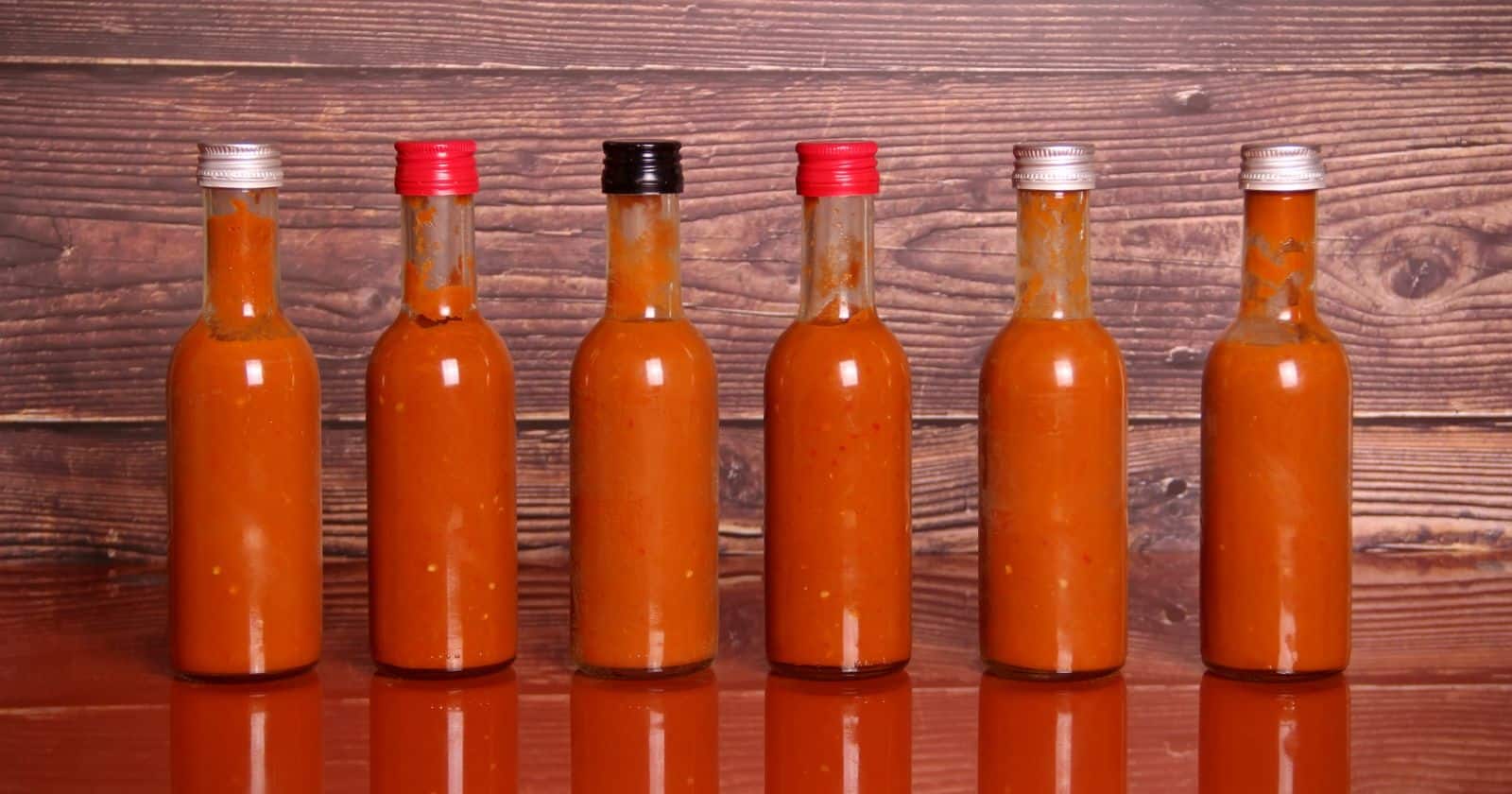Nothing is more frustrating than coming home to find your favorite pair of shoes shredded to pieces. As a dog owner, you’ve likely experienced the agony of having your precious belongings demolished by your curious canine. Chewing is a natural behavior for dogs, but that doesn’t make it any less destructive when they decide your belongings make great chew toys.
You’ve probably tried various methods to curb your dog’s chewing habits, like providing plenty of chew toys or using bitter sprays. But what about using hot sauce? This questionable technique involves applying hot sauce to items you don’t want your dog to chew on. The theory is that they’ll learn to avoid those items after getting a spicy surprise.
Using hot sauce to discipline dogs is controversial. Some claim it’s an affordable, harmless deterrent, while others argue it’s cruel and ineffective. As we’ll explore, there are pros and cons to this unorthodox approach. The bottom line? Hot sauce can work for some dogs, but it also carries risks. We’ll look at both sides, so you can make an informed decision about whether hot sauce training is right for your pooch.
The key to stopping destructive chewing is understanding why your dog does it in the first place. Knowing the root cause will help you address the behavior correctly. With patience and consistency, you can curb chewing in a positive way. There are effective alternatives to hot sauce aversion training that won’t jeopardize your bond with your furry friend.
The Controversy Around Using Hot Sauce on Dogs
The practice of using hot sauce, chili powder, or cayenne pepper to deter dogs from chewing is controversial. There are some reasoned arguments on both sides of the debate:
Reasons Some Dog Owners Use Hot Sauce
- Inexpensive – Hot sauce costs just a few dollars and can be found in any grocery store.
- Non-toxic – Spicy flavors are very unpleasant but generally not harmful to dogs.
- Effective deterrent – The sensitivity of a dog’s nose means hot sauce smells/tastes unpleasant.
- Use on household items – Safe to apply to furniture, shoes, electronics.
Arguments Against Using Hot Sauce on Dogs
- Causes pain/discomfort – Even mildly hot sauce can cause a dog’s mouth to burn or sting.
- Negative associations – Dog may associate pain with the owner, not the hot sauce.
- Damage household items – Hot sauce could stain or bleed onto furniture or carpets.
- Ineffective long-term – Some dogs may ignore or enjoy spicy flavors.
- Health risks – Ingesting hot sauce can cause gastrointestinal issues in dogs.
So should you reach for the Sriracha to stop your dog from chewing your favorite pair of heels? Consider the pros and cons before deciding.
Does Hot Sauce Actually Stop Dogs from Chewing?
There’s no definitive scientific evidence proving hot sauce deters dogs from chewing. But many owners do report success using spicy flavors:
- Temporary deterrent – Most dogs will hesitate to chew an item coated in hot sauce due to the unpleasant sensation.
- Avoidance learning – With repeated exposure, dogs may learn to avoid anything that smells like hot sauce.
- Effectiveness varies – Depends on the dog’s sensitivity to spicy flavors. Many are deterred, but some dogs are not bothered by hot sauce.
- Use as last resort – If no other method has worked to curb destructive chewing.
However, hot sauce also comes with risks:
- Pain and fear – Dog may associate you and hot sauce with a fearful, negative experience.
- Health problems – Ingesting hot sauce can cause mouth burns, upset stomach, and other issues.
- Damage to possessions – Hot sauce could permanently stain carpets, furniture, shoes, etc.
- Ineffective long-term – Once the scent fades, the deterrent effect diminishes.
Overall, while hot sauce may deter chewing in the immediate moment, it does not address the underlying causes of the behavior. There are safer, more effective alternatives.
What Does Expert Advice Say About Using Hot Sauce on Dogs?
Professional dog trainers and behaviorists generally advise against using hot sauce aversion techniques:
- Fear-based methods – Hot sauce uses fear and discomfort to change behavior, rather than positive reinforcement. This can damage the human-canine bond of trust.
- Punishment vs. training – Dogs don’t understand why they are being punished with hot sauce. They learn to fear the sauce, not avoid the destructive behavior.
- Health risks – Ingesting spicy foods can be harmful to dogs if they lick/consume hot sauce directly. It can cause gastrointestinal distress.
- Better alternatives – Positive reinforcement techniques, more patience, and addressing root causes of chewing are more humane and effective.
- Use carefully – If hot sauce must be used, apply only a small amount to deter taste (not cause pain) and watch dog closely. Never use on dogs under 6 months old.
The consensus among vets, trainers, and behavioral experts seems to be hot sauce should be an absolute last resort, if used at all. The risks outweigh potential benefits.
Natural Chew Deterrents for Dogs
If you want to deter chewing without using harsh punishments like hot sauce, some natural alternatives may work:
- Bitter apple spray – Made of harmless natural ingredients, but leaves a bitter, awful taste in a dog’s mouth. Completely safe if licked or ingested.
- Vinegar – Most dogs strongly dislike the sour acidic taste. Wiping furniture with vinegar may deter chewing.
- Citrus smells – Dogs’ sensitive noses dislike strong citrus odors. Rubbing orange peel on objects may be unpleasant enough to curb chewing.
- Pepper – Sprinkling regular black pepper may deter dogs without causing extreme discomfort.
- Air Duster cans – A quick spray of bitter air can interrupt chewing. Dogs associate the strong air blast with an unpleasantness.
These organic deterrents work by creating a negative association, like hot sauce, but are less likely to harm your dog or damage possessions.
Pros
- Safer and gentler on dogs
- Lower risk of accidental ingestion/poisoning
- Don’t damage household items
- Often just as effective as hot sauce
Cons
- More expensive than hot sauce
- The smells fade so must be reapplied
- Deterrent effect varies by dog just as with hot sauce
Why Do Dogs Chew (And How to Stop It)
To curb destructive chewing for good, it’s important to understand the underlying motivation behind the behavior:
Reasons Dogs Chew
- Teething – Soothes sore gums and eases tooth pain
- Boredom – Lack of stimulation and activity
- Anxiety/Stress – Chewing calms dogs
- Natural Instinct – Exploring objects with their mouth
- Attention Seeking – Gets a reaction from owners
Tips to Stop Chewing
- Provide plenty of “good” chew toys – Stuffed Kongs, rope toys, raw bones
- Ensure your dog gets adequate exercise – Prevent boredom and work off energy
- Use crates and baby gates – Limit access to tempting household items
- Ignore unwanted chewing – Don’t reward with attention
- Address stress triggers – Reduce anxiety
With patience and consistency, destructive chewing habits can be corrected by addressing the root causes, not through punishment and deterrents.
Teaching Your Dog Not to Chew
Instead of just punishing chewing, train your dog what to chew:
Use Positive Reinforcement
- Praise and reward with treats when chewing appropriate toys
- Increase durations of “good” chewing slowly
- Use command like “go chew” to direct dog to proper outlets
Manage the Environment
- Remove access to unsafe items – Use baby gates, close doors, put away shoes
- Apply deterrent sprays when unsupervised – Reapply frequently
- Provide a variety of “chew toys” – Rotate novel toys to maintain interest
With diligence and consistency, your dog will learn which items are okay to chew and which are off limits. Patience is key – it may take weeks or months to break a habitual chewing problem.
Is It Ever Acceptable to Use Hot Sauce on Dogs?
Most experts advise against using hot sauce as a training technique. But if you do decide to try it as a last resort, some tips to reduce risks include:
- Apply only tiny amounts of hot sauce – Enough to produce unpleasant taste, not pain
- Never use on puppies under 6 months old
- Thoroughly wash hands after handling hot sauce
- Do not use on dogs with existing gastrointestinal issues
- Choose milder sauces – Avoid ultra-spicy capsaicin extracts
- Constantly monitor dog after application – Ensure he does not lick or ingest sauce
- Immediately clean if sauce contacts eyes, nose, or genitals
- Reapply hot sauce frequently as the smell fades
Even when used carefully, hot sauce carries inherent risks. Proceed with extreme caution and restraint. Avoid overuse at all costs.
The Takeaway on Hot Sauce for Dogs
At best, a tiny amount of hot sauce may temporarily deter your dog from chewing a valued possession. But using spices as punishment can erode the human-canine bond and carries health risks.
Instead, have compassion for the underlying causes of your dog’s destructive chewing. With effort, patience and safer alternatives, you can modify the behavior for good. The most effective “sauce” is the sweet sauce of praise and positive reinforcement.
Ultimately, if your dog has a serious chewing compulsion, consult a professional trainer or animal behaviorist. They can assess the root cause of the issue and create an individualized plan to correct the behavior.
Destructive chewing is frustrating, but remember your dog isn’t being spiteful. They are following natural instincts they don’t understand are unwanted. With compassion, consistency and alternatives to hot sauce, you can resolve the issue in a positive way.
FAQs About Using Hot Sauce on Dogs
1. What kind of hot sauce is safest to use?
If you do decide to try hot sauce, choose a mild variety like Tabasco. Avoid ultra-hot pepper extracts. Start with small amounts to gauge your dog’s tolerance. The goal is deterrence, not pain.
2. Where should hot sauce be applied?
Only apply hot sauce to non-porous surfaces like furniture legs or electronics. Avoid carpets, fabrics, and anything that can’t be easily cleaned. Keep sauce away from your dog’s face, eyes, and genitals.
3. How much hot sauce should be used?
Always start with a very small amount – a few droplets or thin coating. Monitor your dog’s reaction closely. Too much can cause oral burns or stomach issues if ingested.
4. How often does hot sauce need to be reapplied?
Frequently – the strong scent will fade after 15-60 minutes. For continued deterrence, you’ll need to reapply hot sauce 2-3 times per day or more.
5. Are there any risks to my dog licking hot sauce?
Yes, hot sauce carries health risks if ingested. It can cause painful burning of the mouth and gastrointestinal upset. Use extreme caution and monitor your dog closely if attempting hot sauce deterrents. Even mild hot sauce can be damaging if consumed in large quantities.
The risks of using hot sauce on dogs outweigh any potential benefits. It’s best to explore safer, more effective alternatives to curb destructive chewing habits. If hot sauce is used as absolute last resort, proceed with extreme care.





